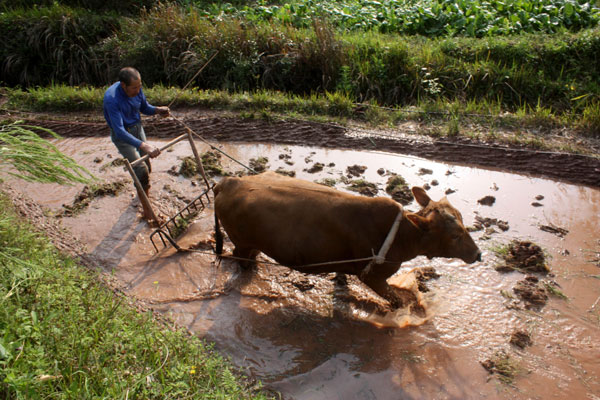
A draft amendment that includes the change of a solitary clause may be able to ease long-standing land disputes in China.
The suggestion, proposed on Monday to the top legislature, the Standing Committee of the National People's Congress, could potentially influence 674 million rural residents, more than half of the people in the world's most populous country.
 |
|
A farmer drives his bull to plough in preparation for rice planting in Yaoping, a village in Chongqing, in April. CHEN JIANHUA / FOR CHINA DAILY |
The only clause in the draft amendment to the Land Administration Law, emphasizing "fairness" in rural land seizure, removes the legislative cap on land compensation, and asks governments to improve the pension and social insurance of landless farmers.
Current land law stipulates that land compensation should not exceed 30 times the land's average annual output in the past three years, although experts have long criticized the standard as rigid and failing to change with economic development and inflation.
Monday's draft, instead, requires that the living conditions of farmers whose land has been seized be improved and their future development be sustainable.
Song Dahan, director of the State Council's Legislative Affairs Office, said governments that seize farmers' housing sites should either offer new houses to farmers or compensate them in cash according to market prices.
"Land compensation will include more dominant factors that can influence land prices, in addition to the current stipulation that only considers annual output value," he said.
Factors such as location, supply-and-demand, local social-economic development and whether the landless farmers are protected by social insurance will be added in.
He said the draft also introduces the principle of "compensation comes first", which prohibits land seizure if the compensation money has not been secured.
To provide long-term protection, the draft asks governments to allocate a specific budget to improve the social insurance of landless farmers. If their rights are being infringed upon, farmers can apply to higher governments to review the decision of land seizure, or resort to courts.
Song admitted illegal expropriation of rural land frequently has occurred in some regions, and it has become a prominent problem endangering social stability.
The Blue Book of China's Society, published by the Chinese Academy of Social Sciences last week, said almost half of the mass incidents in the first eight months of this year were caused by land acquisition and housing demolition. Mass incidents refer to occasions when the public stages a protest to protect rights and interests.
One such incident was in Wukan, a small village in Guangdong that made international headlines when villagers rallied for months in 2011 to protest illegal land seizures and corruption.
Experts said the draft could foil disputes stemming from compensation disagreements and ensure steady land transfer in the coming years, especially as the new leadership is counting on urbanization as the driver to unleash huge domestic demand.
Jiang Ming'an, a professor at Peking University, said urbanization should not be achieved at the cost of farmers' interests.
He said land seizure differs from ordinary land deals in the market, since it is often conducted compulsorily and even against the will of farmers, so the compensation should be higher than market prices.
The annual output of a piece of land may only be thousands of yuan, but its price could multiply hundreds of times when being sold out to developers due to potential commercial values, he said.
China established its current land administration system in 1998, when lawmakers unanimously approved an amendment to the Land Administration Law.
The law puts land into three major categories — rural, constructive and unused — and one of the key features of the system recognizes governments as the only decision-maker who can convert rural land into urban constructive use.
Although the initial purpose of the system is to strictly protect arable land and ensure land supply for construction, the system has been widely criticized as giving way to corruption and abuse of power.
Jiang said the draft clears the way for a long-awaited regulation, which is expected to offer details about better compensation and resettlement for landless farmers.
"The regulation will come out before March," he predicted, "before the central government is expected to step down."
Contact the writer at zhaoyinan@chinadaily.com.cn
